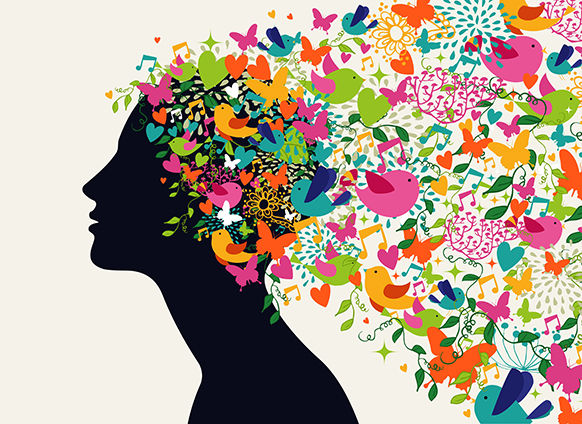How to be Creative when You're just not Feeling it.
- Author Bruce Shields

- Oct 24, 2022
- 5 min read

1. Introduction
We all have days when the "creative well" feels empty. Feeling "tapped out" is normal when you are artistic and continuously creating for joy or your career. I have blogged about burnout, writer's block, and things I do to re-ignite that creative engine in your heart. For today's blog, I felt like revisiting this subject because it happens pretty often, and we need to recognize it, accept it, and deal with it properly so we can go on with our duties.
Writer's block, creative wall, drawing a blank, whatever you want to call it, can be like falling down a flight of stairs. Once it starts, if you don't recognize it and try to "press on," you may find things becoming worse, not better.
So, let's get to it and discuss How to be Creative when You're just not Feeling it.
2. Why is it important to be creative?
If you are like me, artistic, you understand that you first have to create. Secondly, if you do not create, it builds up inside like a fizzy drink and comes out in other ways, such as thoughts, dreams, and things you cannot share with others because they are too difficult to explain. This is why artistic creators developed ways of sharing their creativity, such as art, writing, and sculpting. Thirdly, you must create when it's time, not when you want to. That's the most challenging part for me.
But it is essential to be creative because artists must express themselves through art, music, or whatever allows their expression to be best described. For myself, I know I cannot paint. I have tried, and I am terrible at it. So if I saw my paintings in a gallery, I would pay me to not paint ever again. However, I love looking at paintings! So it is essential to be creative and share that with others so they can enjoy what you create.
3. Ways to increase creativity
So I mentioned that artists have to "be in the mood." This is an unfortunate truth. However, there are ways to invoke that mood!
I remember years ago when I was working on the first novel in the Pandemic Dawn Series, and I needed to write a scene for one of the characters. I was stuck. Although there is a little of the writer in each character, that does not always help when you have a character very different from yourself. I needed "inspiration."
So the first thing I did was search through the internet until I found a face that I thought was my character's. Then I dug through my music until I found a song I thought fit my character's mood for the scene. I listened to it repeatedly, looking at the picture of the face, and suddenly I had it. I was "in the zone" and felt the way they would feel, and I wrote the chapter in one sitting.
Images and music bring about feelings and moods that can inspire us. Read some poems. Most of them are putting feelings or moods into words. Which, strangely enough, works the other way around as well! Reading poems or books about specific subjects can get you in the mood for writing a certain way.
When I needed to get the feeling of an apartment complex in the post-apocalyptic world for my series, I went to an old closed air force base and took pictures of the abandoned houses and buildings.
A walk through city streets or a trail in the woods gives you different inspirations. I have used all these and more to get myself over the hump, through the block, and back to writing.
4. The connection between creativity and mood
The mood is the biggest inspiration for your writing because it controls your creativity and expression.
I remember, as a kid, reading an article about Charles Lutwidge Dodgson. Most know him by the pseudonym, Lewis Carroll. He wrote Alice's Adventures in Wonderland in 1865.
What stuck out most about the article was that Carroll suffered from debilitating migraines. The article noted that in the stories Carroll wrote, some of the scenes were written when he suffered a migraine, which they said was evident in his writing.
I cannot imagine writing with a migraine, but the point is that our mood and state affect our writing. You cannot truly write about starving if you have never gone without food. I mean, creatively speaking, you can. But anyone who has gone without would feel your writing lacked believability.
My wife and I binge-watch television series. That's our time before sleep each night. We get our snacks and drinks, sit in bed watching TV, and love it.
We can watch anything from science fiction to drama, as long as it's written well!
What makes writing good? Creativity that's expressed with feeling. That comes from having the right mood when you write.
5. Why you shouldn't force creativity
Never force creativity. Every artist knows it's time when it's time. So if you're not feeling it, get in the mood with inspiring things, like music, travel, whatever.
Forced or contrived writing is not only painful to read, but the reader also get's "out of the mood" and may lose interest in your book.
Timing is important. The wine served too early is grape juice. Don't force it or fake it. If you are not feeling it, search for inspiration!
6. How to tell if you should take a break
One of my greatest moves is how to tell if you should take a break. I use this in all aspects of my life, not just writing.
Years ago, I owned my own IT business. I was working on writing some scripts with very complicated mathematical formulas. I kept tripping over the numbers, missing commas and using the wrong functions. The harder I tried, the more mistakes I made. Out of frustration, I decided, "this isn't happening today," and I worked on something else.
The next day I returned to the formula, and wouldn't you know it, after a few minutes, it was working flawlessly! I couldn't believe it.
I started paying attention to myself when I worked from that time on. Finally, I noticed something. Whether working on computers, art, or writing made no difference. When I was struggling, walking away and coming back later always worked! So I started using that practice, even when it did not fit my schedule. Why? Because being done efficiently and correctly is more important than beating the clock.
How did this fit into my business? Simple, realistic expectations on project completion. When quoting a customer, if I thought I could do the project in 7 days, I would simply quote 12-14 days.
This gave me wiggle room if I needed a break or time to search for inspiration, and I always had it done before 14 days, so the customer was always happy they got their product early.
Really a win, win.
So never be afraid to take a break, and come back fresh.
7. To wrap things up
So though it is important to be creative, timing is essential. If you are not feeling it, search for inspiration. There is a lot of inspiration out there: walks, music, looking at art, watching a movie, and reading a book. Use inspirations to manipulate your mood for writing and creating. Then, your readers will "feel it." Don't force it. Invite it and wait. Take a break when necessary, and return when it's time.
I hope you found some valuable tips today. Like and share this article with friends and family who are creative. They may need to hear this.
Also, subscribe to my website and read articles like this that will help you be creative.




Comments